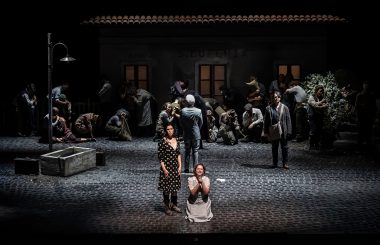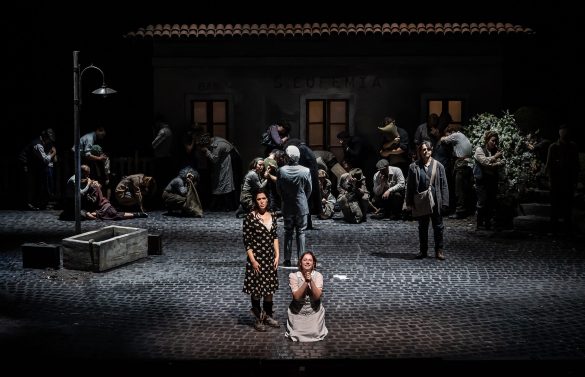
 Ireland Wexford Festival Opera 2023 [3] – Marco Tutino, La Ciociara: Soloists, Chorus and Orchestra of Wexford Opera Festival / Francesco Cilluffo (conductor), O’Reilly Theatre, National Opera House, Wexford 2.11.2023. (RB)
Ireland Wexford Festival Opera 2023 [3] – Marco Tutino, La Ciociara: Soloists, Chorus and Orchestra of Wexford Opera Festival / Francesco Cilluffo (conductor), O’Reilly Theatre, National Opera House, Wexford 2.11.2023. (RB)

The last of the main operas at this year’s Wexford Opera Festival, La Ciociara, tells the harrowing story of a woman attempting to shield her teenage daughter from the horrors of war. The material is derived from a 1958 novel by Alberto Moravia. However, it is best known as the 1960 film, Two Women which won Sophia Loren an Academy Award for Best Actress and made her the first such winner for a non-English language film. An operatic version was commissioned from the composer, Marco Tutino, by San Francisco Opera and it premiered there in June 2015.
Tutino has written about a dozen operas including La Lupa, a verismo work designed to celebrate the centenary of Macagni’s Cavalleria rusticana. He has described La Ciociara as ‘neo verismo’. Tutino revised the orchestration for La Ciociara and it was this new version of the opera which received its premiere at the Wexford Festival. This opera displayed many of the traits of verismo opera including a focus on greater realism and on the lives of ordinary people. The score was closely integrated with the libretto and the music had a lush late Romantic texture. The source material is compelling and harrowing in equal measure and the opera portrayed the story brilliantly.
The opera opens in Rome in the middle of the WWII. A widowed shopkeeper, Cesira is forced to sleep with Giovanni to gain passage for her and her daughter, Rosetta, to Ciociara, the Italian mountain village of Cesira’s youth. Cesira is befriended by the bookish pacifist, Michele, in Ciociara and he becomes her lover. Giovanni collaborates with the Nazis and pursues Cesira. This leads to the death of Michele at the hands of Giovanni and the rape of Cesira and her daughter by marauding Moroccan troops. The ensuing trauma causes a rift between Cesira and her daughter, but they reconcile on learning of the death of Michele.
Rosetta Cucchi’s production uses the device of the film director viewing his own production on set. The original film director was seated at the side of the stage and watched as the climactic events unfolded. Tiziano Santi’s sets included a shop in Rome, a bar, the interior of a house and an abandoned church in Ciociara. They were highly effective in capturing the war-torn privations faced by the general population. Daniele Naldi’s lighting effects helped capture the precarious atmosphere of the WWII and the contrast with the sunlit mountain village. Black and white film footage was shown during orchestral interludes, and it showed the journey of the two women and the development of the relationship between them and Michele. The production brought home the brutal aspects of war and the way in which violence can suddenly erupt in the lives of ordinary people. There was a brilliant split screen effect in Act II which showed Cesira and Rosetta trying to escape Moroccan soldiers and Michele being tortured by the Nazis and their accomplice Giovanni.
Na’ama Goldman is a consummate actress and she excelled in the role of Cesira. She portrayed Cesira as a pragmatic, resourceful but principled individual, willing to have sex with Giovanni to escape the dangers in Rome, able to handle the dangers posed by a German Field Marshall at the beginning of the second act, and willing to take risks by rescuing a wounded British soldier. The scene where she tries to get her daughter away from the Moroccan soldiers was electrifying and one of the high points of the opera. Goldman has a powerful mezzo-soprano voice that was able to project forcefully against powerful orchestral forces. Her musical phrasing was impeccable, and she brought a rich palette of colours to convey the shifting emotions of the character. During the course of the opera, one could hear her alarm, her passion, and her heartrending cry of despair in the post violation scene.
The rest of the cast were firing on all cylinders throughout the production. Leonardo Caimi was very impressive in the role of Michele and there was an excellent rapport between him and Goldman. He brought a melting lyricism to the vocal line and dispatched the top notes with effortless ease soaring above the orchestral forces. Jade Phoenix did a fine job portraying Rosetta’s descent from frightened ingénue at the beginning of Act I to a damaged and dissolute woman towards the end of the opera. She sang beautifully with a ringing, clear soprano voice and brought an exquisite lyricism to the vocal line. David Ceconi succeeded in getting to the black heart of Giovanni, a character in the Scarpia mould. He has an excellent baritone voice which he used to good effect and at key points he injected a vicious cruelty into the vocal line. He seemed to enjoy toying with his victims and made no bones about serving his own self-interests against the greater good. The rest of the cast all acquitted themselves well.
Francesco Cilluffo did an excellent job ensuring the soloists, orchestra and chorus remained on track. He and the Wexford Festival Orchestra conjured Tutino’s lush Romantic textures and sonorities from the score. The orchestra enveloped the singers with soaring and passionate music and the dramatic tension remained high. The orchestral interludes were played beautifully and indeed contained some of the most memorable music of the evening. The Wexford Festival Chorus did a brilliant job accompanying the singers and enhanced the powerful impact of the music.
Overall, the was an outstanding performance which was deservedly greeted with a standing ovation from the audience. I very much hope Tutino’s opera will be heard much more widely after this performance.
Robert Beattie
Production:
Director – Rosetta Cucchi
Set designer – Tiziano Santi
Costume designer – Claudia Pernigotti
Lighting designer – Daniele Naldi
Assistant director – Stefania Panighini
Assistant Set designer – Veronica Lattuada
Cast:
Cesira – Na’ama Goldman
Rosetta – Jade Phoenix
Michele – Leonardo Caimi
Giovanni – David Cecconi
Fedor von Bock – Alexander Keichle
John Buckley – Allen Boxer
Lena – Carolyn Dobbin
Pasquale Sciortino – Conor Prendiville
Maria Sciortino / Una donna – Erin Fflur
Un Ragazzo – Julian Henao Gonzalez
Una Popolana – Grace Maria Wain
Soldato 1 – Meilir Jones
Soldato 2 – Christian Loizou
Soldato 3 – Will Searle
Vittorio De Sica – Peter McCamley
Dancers – Luisa Baldinetti, Andrea Bassi, Roberto Capone, Yaimara Gomez Fabre, Miryam Tomè, Andrea Zanforlin
